Blog/Clienteling/Empower Clienteling in China with WeCom’s Unanswered Reminders
In the realm of customer engagement, revitalizing dormant customers is crucial. Yet, it’s equally vital to keep a close eye on how swiftly sales associates and brand representatives respond to customer inquiries.
A delayed or absent response not only impacts how customers perceive the service quality but also influences their choice to make a purchase.
In this article, we’ll delve into the significance of prompt responses in clienteling and explore how to leverage WeCom to mitigate this challenge, ultimately avoiding losing more leads.
Table of Contents
- Why Responding Quickly Matters in Clienteling & Customer Service
- How to Improve Customer Response Rate in Clienteling in China
- Elevate Clienteling in China with WeCom’s Unanswered Reminders
- To Wrap Up
Why Responding Quickly Matters in Clienteling & Customer Service
According to the State of the Connected Customer report by Salesforce (2023): 77% of customers expect immediate interaction when reaching out to a company.
A slow response time can erode customer trust and satisfaction, directly influencing conversion rates. Therefore, brands must minimize delayed or complete lack of responses from Sales Associates, Client Advisors, and Customer Service reps.
Swift responses aren’t just good practice – they can become a competitive advantage. In fact, almost half of customers are willing to pay extra for superior customer service (Salesforce, 2023). In times of economic uncertainty and price sensitivity, this highlights the need to enhance the customer experience.
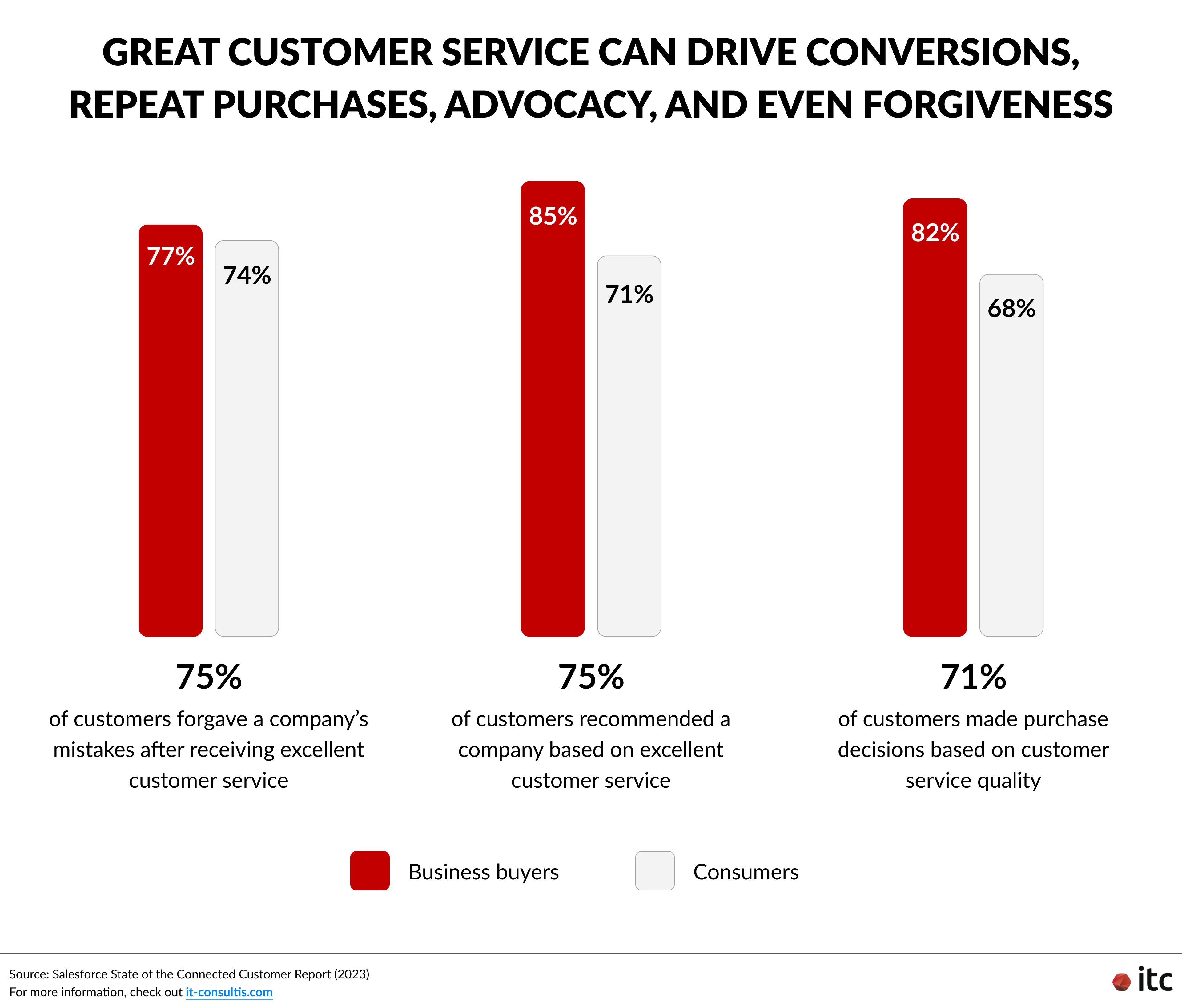
This is even more crucial for business buyers in the B2B and B2B2C sectors, which typically involve lengthier sales cycles and many stakeholders in the decision-making process. Customer service can seriously become the deal-breaker as 82% have reportedly made purchase decisions based on this criterion (Salesforce, 2023).
How to Improve Customer Response Rate in Clienteling in China
Set Up Standard Operating Procedures (SOPs)
To ensure a speedy response time and avoid leaving customers without a reply, it’s crucial to establish Standard Operating Procedures (SOPs).
These procedures should clearly outline necessary processes, key performance indicators (KPIs), and incentivization schemes (if any), providing companies with visibility into all customer interactions and ease of employee performance management.
Empower Employees through Education & Training
Brands should conduct training sessions and establish an internal knowledge base to ensure employees understand the brand and its products/services and are equipped with the necessary skills to be professional front-line ambassadors. This is crucial for delivering excellent clienteling or customer service that matches the brand’s positioning.
Leverage The Right Technologies for Better Efficiency
Using dedicated clienteling tools like WeCom (WeChat Work) and other technologies can help brands better streamline workflows and enhance the performance of Sales Associates. This not only improves efficiency but also reduces human errors from manual tasks (i.e., finding unanswered messages).
It’s important to note that this would not be possible if brands relied on Sales Associates’ personal WeChat accounts for clienteling in China. Since it is not a dedicated tool for clienteling, WeChat would give brands and managers zero visibility into the activities and conversations between the staff and the leads or customers.
In the next section, we’ll explore how brands can maximize WeCom and the session content archiving function to establish an automatic reminder system for timely responses.
Keep in mind that this archiving function is not native to WeCom. It requires additional development and/or integration with supporting third-party tools like ITC Clienteling Solution.
Elevate Clienteling in China with WeCom’s Unanswered Reminders
Automatic Reminders for Unanswered Messages
Based on the conversations archived, WeCom can pinpoint situations where Sales Associates haven’t replied to customer messages.
Brands can establish predefined response time limits and use semantic analysis rules to trigger reminders. For instance, if a customer’s question remains unanswered for 15 minutes, the assigned employee would automatically receive a reminder from WeCom to follow up.
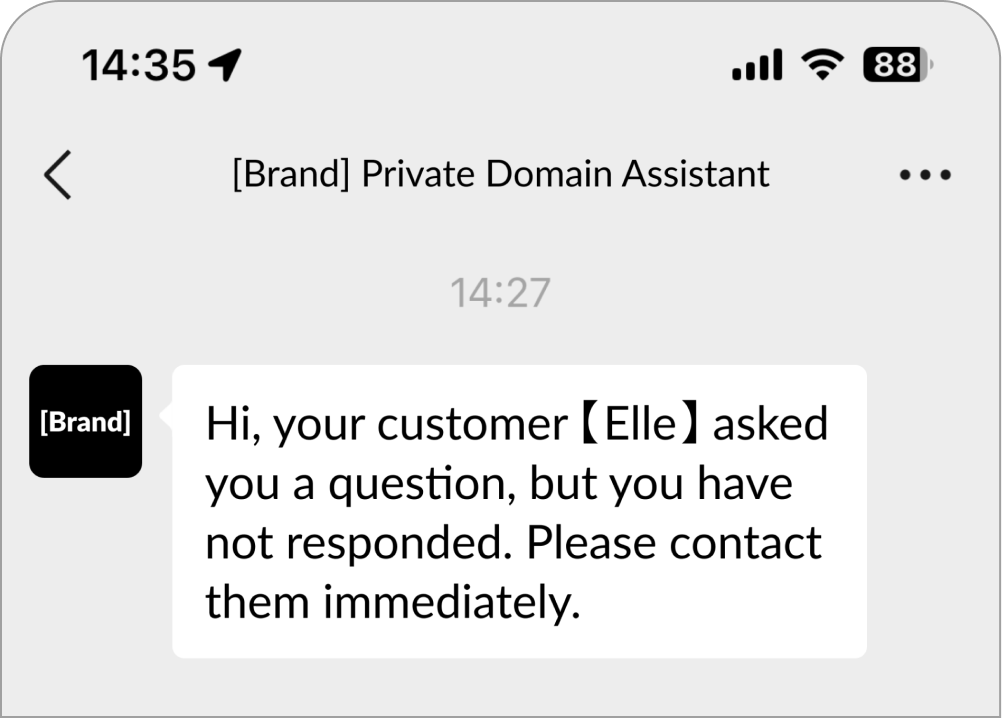
Escalated Reminders to Direct Attention
Brands should be aware that various situations may impede quick responses, even with automatic reminders. Employees might be busy with other urgent tasks, face difficulties in resolving issues, or decide to completely overlook reminders.
To address these situations, companies can establish a protocol where the system reports such cases to higher-level managers for review. The time for escalation can be flexibly set based on the business model and the company’s needs (e.g., after 1 hour, 6 hours, 1 week, etc.).
Additionally, brands can set up multiple system reminders to escalate to higher-level managers again if unanswered messages persist (WeCom Private Operation: From Entry to Mastery, 2022).
Weekly Report of Unanswered Queries & Staff Performance Management
Other than setting up triggers and automatic reminders, brands can leverage WeCom’s native function and Natural Language Processing (NLP) technology to compile a weekly summary of unanswered customer queries, along with other customer engagement statistics.
This includes details like the customer, responsible employee, and when the queries were sent, average response rate, average time to reply to the first message. The system organizes these data into a report for managers or they can check them on the WeCom backend.
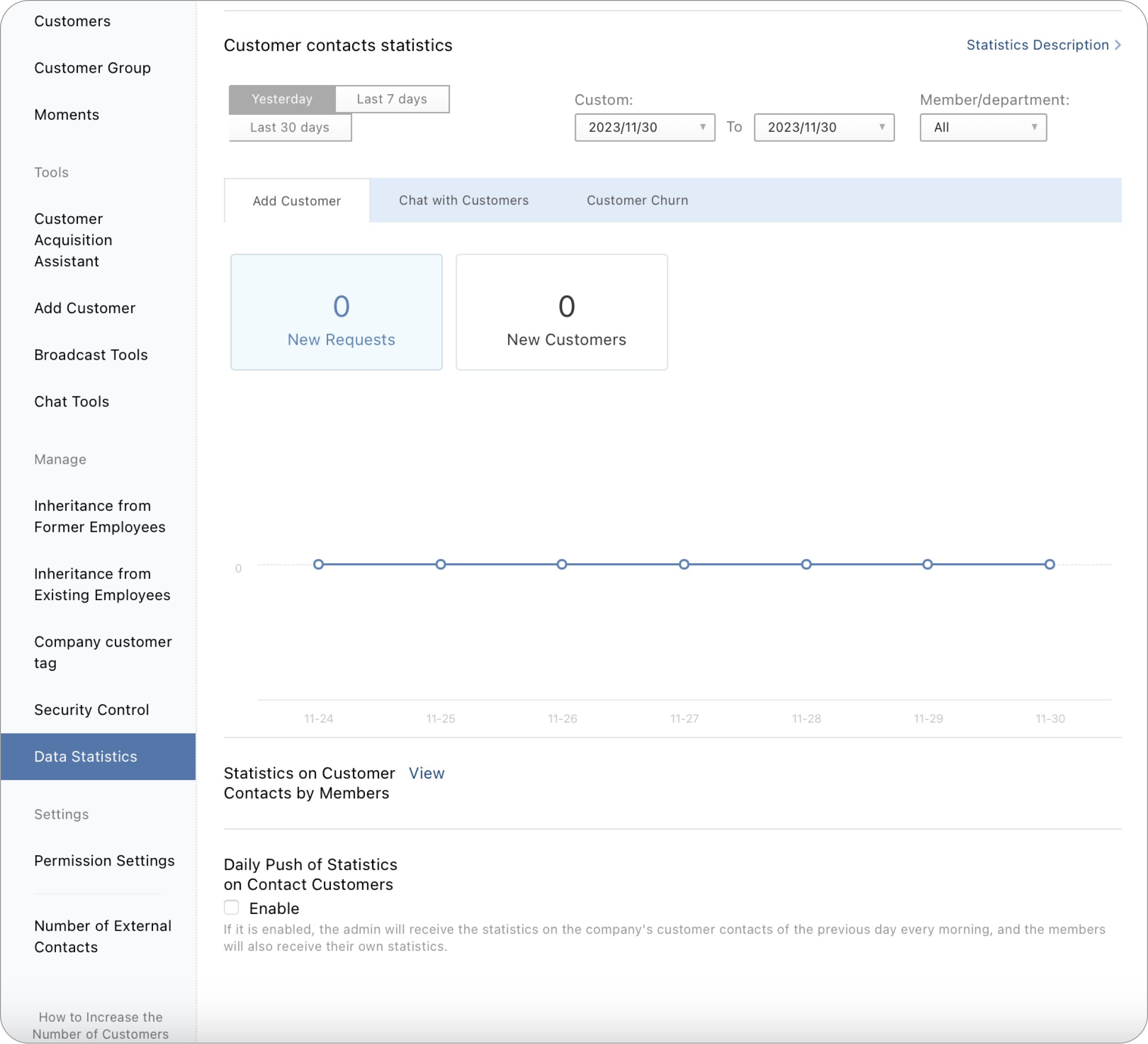
When integrating third-party tools like the ITC Clienteling Solution, in addition to the clienteling communication, brands can capture the chat history from the customer service module as well.
This not only identifies unanswered queries but also provides crucial insights for the brand and Sales Associates to better understand customer needs and preferences.
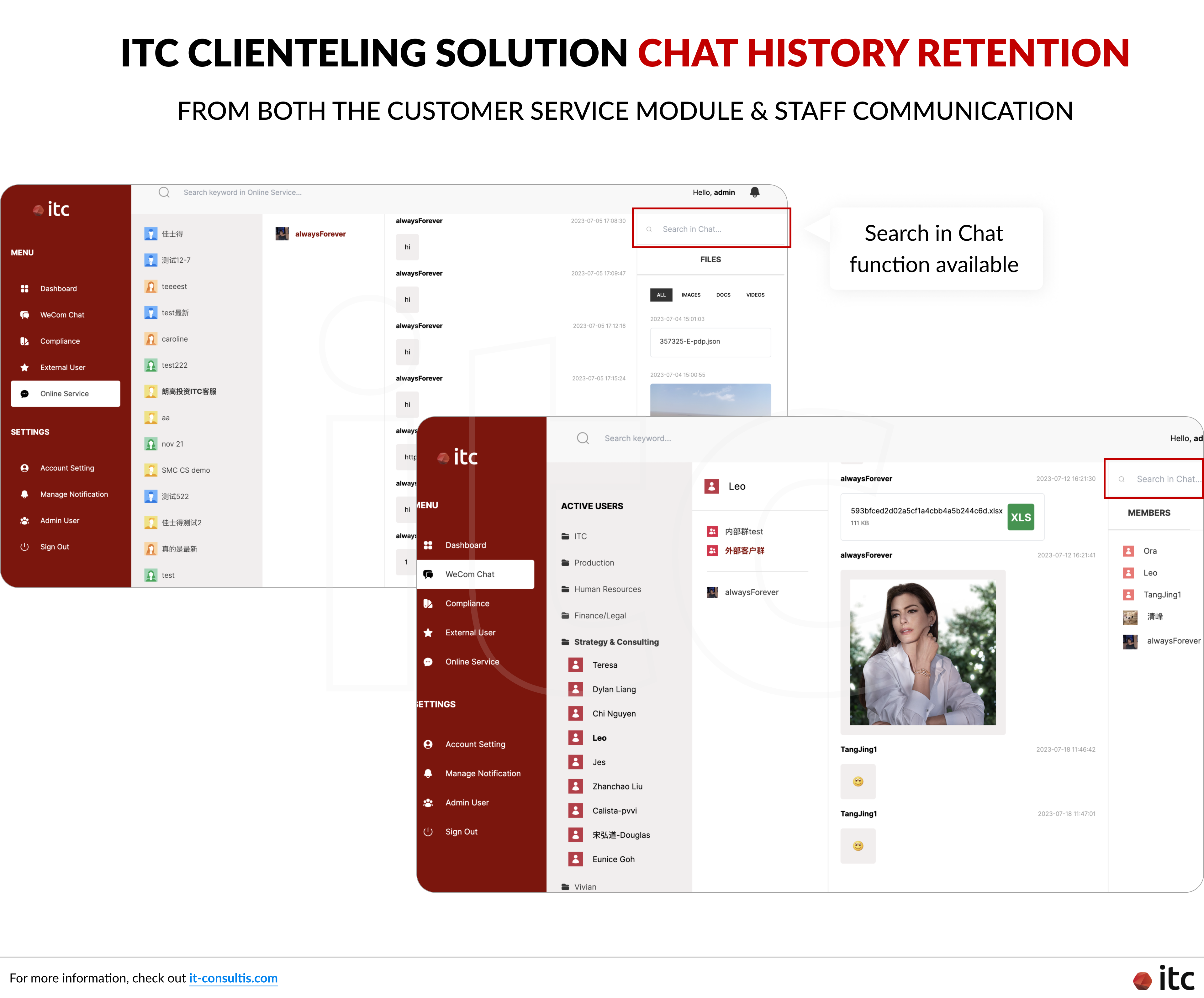
Taking it a step further, employing advanced NLP features with ITC Clienteling Solution can allow brands to analyze chat content and gauge subjective customer emotions, engagement levels, and conversion potential via sentiment scoring.
This data, coupled with user profiles and transaction history, can enable brands to anticipate and respond to customer needs more accurately and enhance customer experiences, including in terms of timeliness.
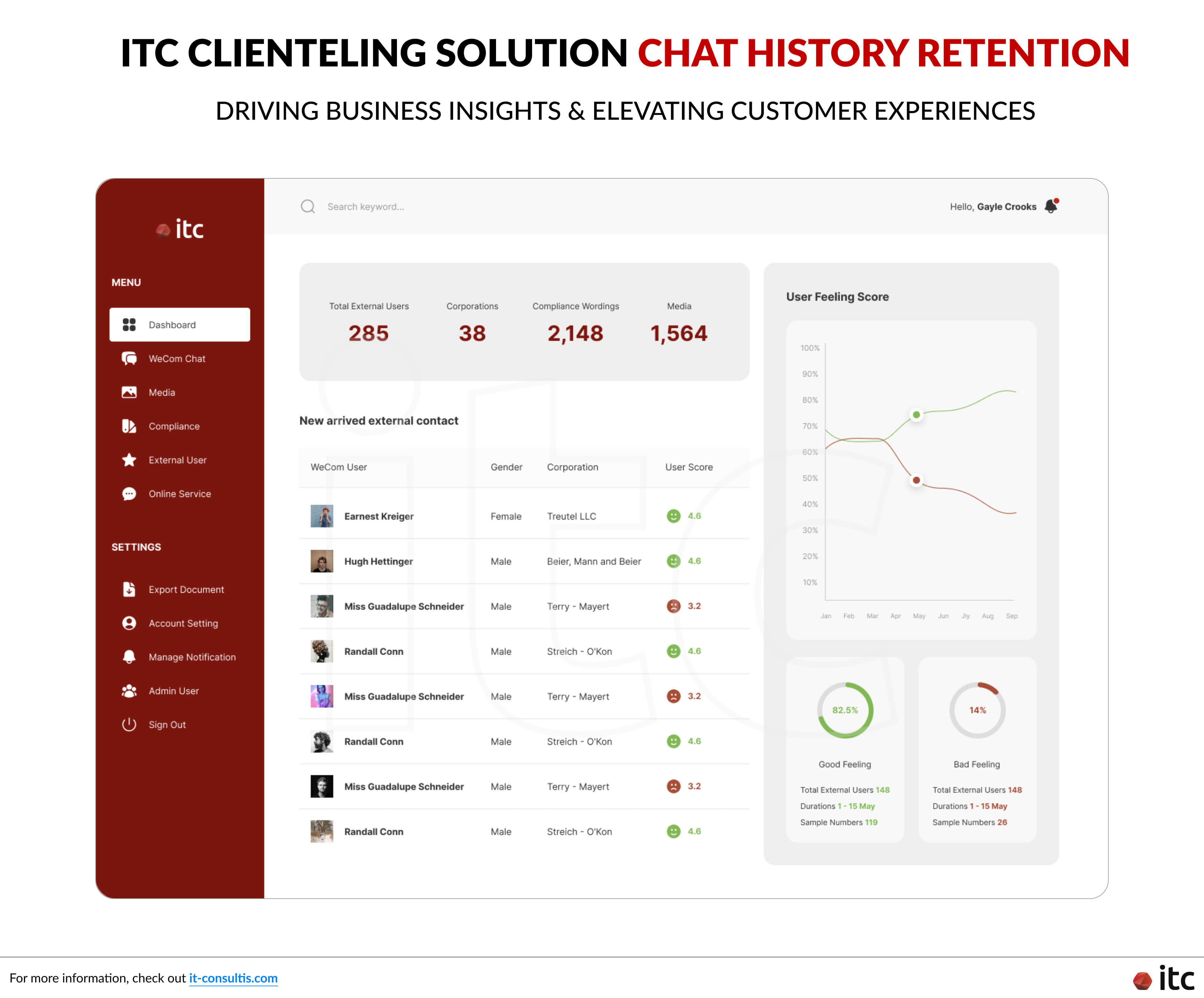
The enhanced data not only aids personalized targeting in private traffic domains like WeCom (WeChat Work) but also extends to media buying and paid advertising.
Additionally, brands can further analyze specific customer segments to uncover more common attributes, maximizing the power of private traffic and CRM data.
Aside from the weekly summary and customer reports from WeCom’s backend, the ITC Clienteling Solution can provide brands with more advanced customed Customer Data Report views. This includes tracking customer growth, response rate, average response time, churn rate, and other statistics.
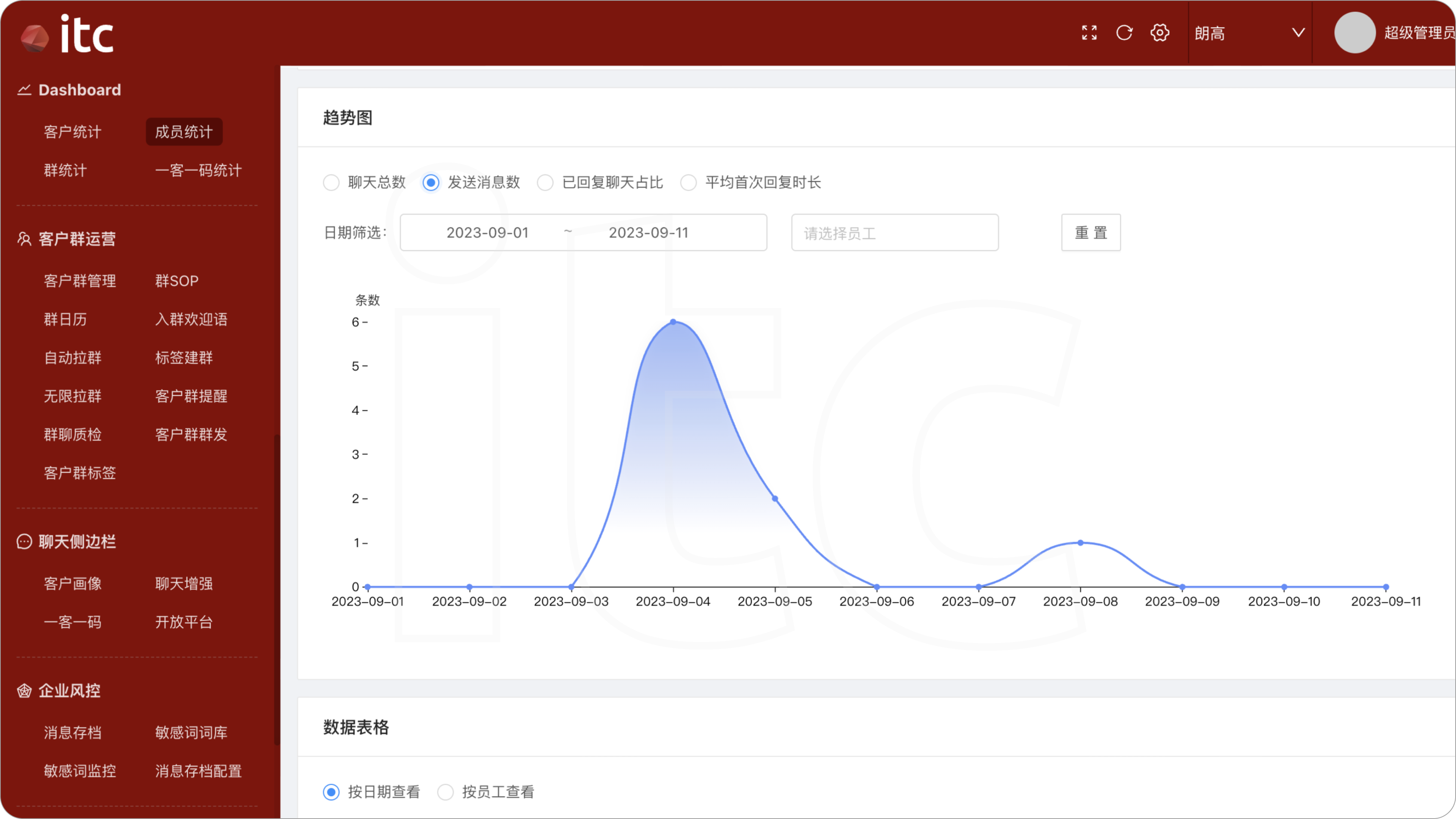
Weekly and monthly analytics reports help managers evaluate and manage employee performance, while identifying and addressing key issues promptly (e.g., the employee is still lacking or has a poor attitude; tasks are not equally distributed; employees are overloaded).
Ultimately, with the right training, KPIs, and incentivization, managers can facilitate faster follow-up times, boost employee morale, streamline processes, reduce churn rate, and improve sales conversions.
To Wrap Up
As we’ve explored in this article, a delayed or absent response not only affects customer perceptions of service quality but can also significantly influence the purchasing decisions of both B2C and B2B customers.
Recognizing this, businesses need to place more emphasis on reducing the average response times in clienteling and customer service across all digital channels. However, quality cannot be traded off for speed – customers demand both.
Therefore, in China where customers frequent WeChat, the integration of WeCom (WeChat Work)’s innovative features, other supporting technologies, and strategic clienteling practices can help brands not only meet the immediate need for timely responses but also lay the foundation for sustainable, customer-centric success in the ever-evolving market.
Looking ahead, Salesforce is expanding its presence in China, offering more localized offerings. Leveraging the right clienteling tool, be it Salesforce or other tailor-built systems, can significantly impact service quality and brand perception. Backing your strategies with analytics can support your retail team throughout the process, even in the face of potential pushbacks and challenges.





